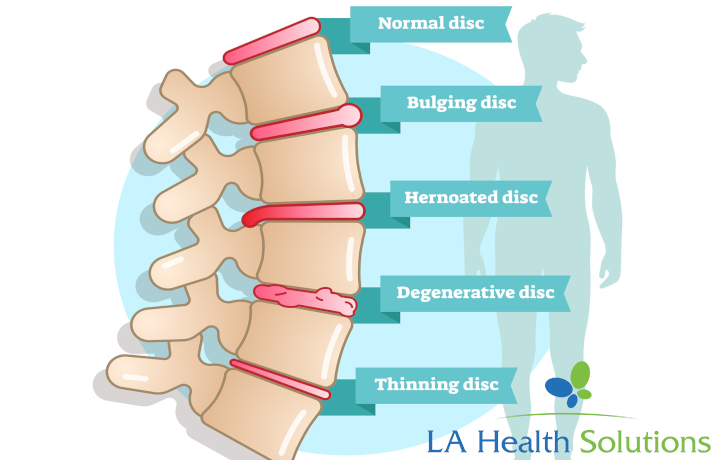Degenerative Disc Disease: Causes, Symptoms & Treatments
Degenerative Disc Disease refers to the symptoms of back or neck pain caused by the wear on a spinal disc. It is one of the most common causes for lower back and neck pain. It can also cause numbness, weakness, and even shooting pains in the arms or legs. The cervical spine and the lumbar spine are the areas of the body that involve a lot of motion and stress which make them susceptible to disc degeneration. The spinal disks are the shock absorbers between the vertebrae, spine and bone. They help with flexibility and enable bending and twisting. Unfortunately, as people get older, the spinal disks can break down and lead to degenerative disc disease.Causes
Degenerative disc disease is caused by the spinal disks wearing out. The spinal disks are made of a soft inner core and a durable outer wall. If the disks change in structure and are worn down, it can cause pain. The spinal disks are composed of predominately water at birth. But, as you age, the disks lose water and get thinner. The dried out spinal disks do not absorb the shocks as well and provide less cushion or padding between the vertebrae which can lead to degenerative disc disease. A crack in the spinal disks can also cause pain. The stress of everyday movements and injuries can cause tiny tears in the outer walls of the disks and can cause nerve pain. A Bulging Disc or a herniated disk may occur.Symptoms
The degenerative disc disease symptoms normally include a sharp or constant pain the back and neck. The symptoms and the location of the pain will depend on where the weak disk is located. The most common signs include pain that is in the lower back, buttocks and upper thighs. The pain will come and go, it can be dull to severe, and it can last for a few days to a few months. Most people find that the pain is worse when sitting compared to moving and walking. In some cases, the degenerative disc disease can lead to numbness and tingling in the arms and legs and even cause the leg muscles to become weak.Treatments
The main goal for treating degenerative disc disease is to ease pain and stop any more damage. After your doctor diagnoses the disease through analyzing your medical history and through reviewing your X-ray and MRI, s/he will suggest the best plan based on your symptoms and severity of the degeneration of the spinal disks. Treatments may include over the counter pain relievers to help reduce inflammation and less pain. Your doctor may even prescribe a stronger pain medication if needed. Physical therapy may help strengthen the muscles in the neck and back to improve strength and flexibility. Steriod shots have also been found to help ease pain and reduce inflammation. If all other treatments do not work, your doctor may recommend surgery which can include a discectomy to remove the injured part of the disk or maybe disk removal or artificial replacement. If you have a severe problem, your doctor may fuse the bones in your spine after the disk is removed.
Our clinics offer a variety of patient services including physical therapy, chiropractic treatment, personal injury, work reconditioning, laser therapy, orthopedic surgery, interventional pain management, neurology and neurosurgery. We have the best healthcare professionals and resources available which means our patients will save time on the approval process, receive faster referral and appointment times, and get the right treatments needed to get well. Your LA Health Solutions’ team will take care of the paperwork so you can concentrate on getting well.
Telephone: 844-496-LAHS (5247)

